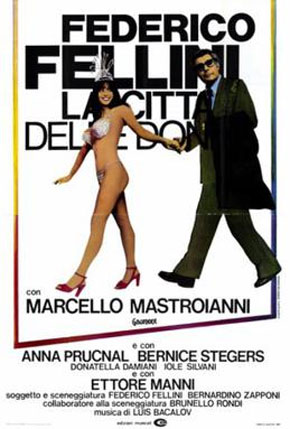
Baseball's Active Leaders, 2023
What Trump Said When About COVID
Recent Reviews
Everything Everywhere All at Once (2022)
Black Panther: Wakanda Forever (2022)
Doctor Strange in the Multiverse of Madness (2022)
Spider-Man: No Way Home (2021)
The Cagneys
A Midsummer Night's Dream (1935)
Something to Sing About (1937)
Angels with Dirty Faces (1938)
A Lion Is In the Streets (1953)
Man of a Thousand Faces (1957)
Never Steal Anything Small (1959)
Shake Hands With the Devil (1959)
La Citta delle donne (1980)
City of Women is Federico Fellini's dream/nightmare about Woman in all her forms: temptress, tease, feminist; as something to pursue and something to run from; and above all as something unattainable and unknowable.
Written by:
Federico Fellini
Brunello Rondi
Bernardo Zapponi
Directed by:
Federico Fellini
Starring:
Marcello Mastroianni
Anna Prucnal
Bernice Stegers
Jole Silvani
Donatella Damiani
Ettore Manni
Fiammetta Baralla
Helene Calzarelli
Awards: Italian National Syndicate of Film Journalists:
Best Director
Best Cinematography
Best Production Design
Best Costume Design
Quote:
"They've all got fever-fever for my beaver-beaver."
The story is literally a dream. Snaporaz (Marcello Mastroianni, once again acting as Fellini's surrogate) is dozing on a train when he begins a flirtation with the woman across from him. She leaves the compartment; he pursues. She leaves the train; he pursues — chiding himself all the while, a middle-aged man acting the boy. Eventually he follows her to a hotel in the woods where a convention of ardent, angry feminists is underway. They condemn masculine sounds and celebrate gentle, feminine sounds. They invent new names for the vagina (tongue of light; smile of life; moon-violet). They protest the very act of penetration and attempt to abolish fellatio. The deeper he goes into the hotel, the angrier and more anarchic their behavior. But Snaporaz seems oblivious. He's in smiling, single-minded pursuit of...moon-violet. It's not until the woman on the train betrays him that he attempts to leave.
Ah, but this is a dream and escape is never easy. He is forced to roller skate with youthful, giggling women. Even when he escapes the hotel — on the motorcycle of a rotund, garbage lady — he can't escape. The garbage lady drives him to a vaginal greenhouse in the middle of a field and falls all over him. One rescue merely leads to another predicament. Eventually he finds temporary refuge in the home of "Zuberkock," a robe and chain-wearing, rifle-toting man making a last stand against the tyranny of women surrounding him. He rails against "lesbos" and bemoans the toppling of a 100-year-old pine tree. It's in Zuberkock's home that Snaporaz comes across the gallery of conquest: a hallway filled with unlit paintings, which, when the switch is thrown, reveals both a picture of the woman and the soundtrack to her orgasm. Beautiful. The gallery is huge and that evening is Zuberkock's ten thousandth conquest, which, he proclaims, will be his last. (This in the age before Wilt Chamberlain gave us a new standard.)
More titillation and humiliation await until finally Snaporaz enters the belly of the beast: gliding down a slide which is part carnival ride, part fallopian tube, while he recalls the early temptresses (both real and cinematic) of his life.
City of Women is obviously of a particular time and place: An aging philanderer's reaction to the feminism of the 1970s. It's also literally a dream, and, as such, can drag a bit - no one's dreams are that interesting. Yet when the charges are finally read against Snaporaz, no man can claim himself entirely innocent: "He has no ready answers... He never gives, nor lends, nor trusts... He repeats himself. He wears socks in bed. He's guilty of being aloof, self-indulgent. He pities himself... He can't commit himself to one woman. He deceives himself by imagining an ideal woman... He believes that women are mentally inferior. He considers them superior beings."
—October 27, 2001
© 2001 Erik Lundegaard







